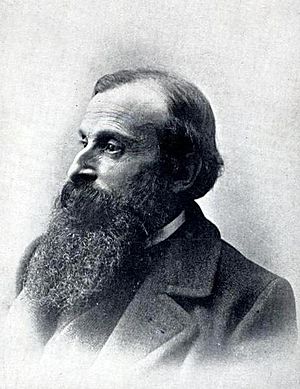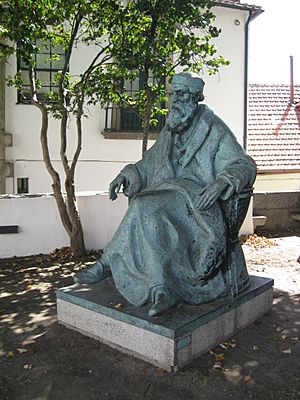Guerra Junqueiro facts for kids
Quick facts for kids
Abílio Manuel Guerra Junqueiro
|
|
|---|---|

Junqueiro circa 1900
|
|
| Born | 17 September 1850 Freixo de Espada à Cinta, Portugal
|
| Died | July 7, 1923 (aged 72) Lisbon, Portugal
|
| Occupation | Civil servant, politician, journalist, author and poet. |
Abílio Manuel Guerra Junqueiro (born September 17, 1850 – died July 7, 1923) was a famous Portuguese writer and poet. He was also an important government worker, a member of parliament, and a journalist. His writings played a big part in inspiring the creation of the Portuguese First Republic. Junqueiro wrote funny and sharp poems that made fun of old ways of thinking, romantic ideas, and even the Church. These poems helped lead to the Portuguese Revolution in 1910. He is known as one of Europe's greatest poets. Junqueiro studied law at the University of Coimbra.
Contents
Life Story of Guerra Junqueiro
Abílio Manuel Guerra Junqueiro was born in Freixo de Espada à Cinta, a region called Trás-os-Montes, in Portugal. His father, José António Junqueiro Júnior, was a businessman and farmer. His mother, Ana Maria Guerra, sadly passed away when he was only three years old.
His Education and Early Career
He went to high school in Bragança. When he was sixteen, he started studying theology at the University of Coimbra. After two years, he changed his studies to law and finished his degree in 1873.
After university, he became a secretary for the governor of Angra do Heroísmo, in the Azores islands. Later, he worked as a secretary in Viana do Castelo. In 1878, he was chosen to be a member of the House of Representatives, which is like a parliament where laws are made.
Impact of His Writings
In 1885, Junqueiro published a book in Porto called A velhice do Padre Eterno. This book caused a lot of strong criticism from the Portuguese Catholic Church.
Around 1890, Portugal faced a big political problem called the 1890 British Ultimatum. This event made many people unhappy with the government. Junqueiro got involved in the political discussions. He wrote several popular books that greatly influenced public opinion. His writings helped to make the Portuguese monarchy less popular. They also helped the Portuguese Republican Party succeed in the 1910 Portuguese Revolution, which led to the end of the monarchy. He also translated short stories by the famous writer Hans Christian Andersen into Portuguese.
Family and Legacy
Abílio Guerra Junqueiro married Filomena Augusta da Silva Neves on February 10, 1880. They had two daughters: Maria Isabel Guerra Junqueiro, born in 1880, and Júlia Guerra Junqueiro, born in 1881. He passed away in Lisbon when he was 72 years old.
In 1940, Junqueiro's daughter gave his family home in Porto to the city. This home became the Guerra Junqueiro Museum. It is a place where people can learn about his life and see his belongings.
His Published Works
Here are some of the books and poems written by Guerra Junqueiro:
- Viagem À Roda Da Parvónia
- A Morte De D. João (1874)
- Contos para a infância (1875)
- A Musa Em Férias (1879)
- A velhice do Padre Eterno (1885)
- Finis Patriae (1890)
- Os Simples (1892)
- Oração Ao Pão (1903)
- Oração À Luz (1904)
- Gritos da Alma (1912)
- Pátria (1915)
- Poesias Dispersas (1920)
- Duas páginas dos quatorze anos
- O Melro
See also
 In Spanish: Abílio Manuel Guerra Junqueiro para niños
In Spanish: Abílio Manuel Guerra Junqueiro para niños


